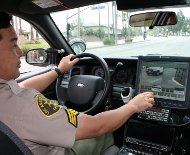Article from: www.thenewspaper.com/news/40/4023.asp
2/15/2013
Georgia: License Plate Cameras Approved For Traffic Stops
Georgia Appeals Court backs use of license plate scanners for traffic stops even when the database information is incorrect.
 Police in Georgia may stop vehicles based solely on the reading of an automated license plate camera, and the stops are valid even if the machine is wrong. The state's second highest court last week backed the use of automated license plate readers (ALPR or ANPR in Europe) as used by the Gwinnett County Sheriff's Department. The agency has several patrol cars equipped with cameras that scan passing vehicles, recording a history of who drives where while also checking against a database of "wanted" individuals who either have warrants out for their arrest or who owe money to the Department of Motor Vehicles.
Police in Georgia may stop vehicles based solely on the reading of an automated license plate camera, and the stops are valid even if the machine is wrong. The state's second highest court last week backed the use of automated license plate readers (ALPR or ANPR in Europe) as used by the Gwinnett County Sheriff's Department. The agency has several patrol cars equipped with cameras that scan passing vehicles, recording a history of who drives where while also checking against a database of "wanted" individuals who either have warrants out for their arrest or who owe money to the Department of Motor Vehicles.
The laptop in a patrol car alerted on Georgia State Route 316 when the car being driven by Salomon Hernandez-Lopez passed by. The database informed the deputy that a failure-to-appear warrant had been issued for Eloy Hernandez-Lopez, who was not in the vehicle. During the traffic stop, Salomon Hernandez-Lopez was asked for his driver's license, which he could not produce because he did not have one. Hernandez-Lopez was then charged and convicted of driving without a license, which he appealed on the grounds that the traffic stop was invalid in the first place. A three-judge appellate panel sided with the lower court in seeing the tracking camera as an ordinary piece of equipment.
"The information retrieved via the LPR system is not unlike that an officer retrieves by way of running vehicle-tag numbers through GCIC, which we have previously held provides justification for an initial stop," Judge Stephen Dillard ruled for the court. "LPR system at issue in the case sub judice merely aided the officer by augmenting his sensory faculties, providing an enhanced ability to process tag information through a law-enforcement database rather than requiring the officer to manually conduct random checks."
The judges found that the license plate and the database information created a reasonable, articulable suspicion sufficient to justify a traffic stop. They declined to consider Hernandez-Lopez's argument that the system leads to the detention of individuals who have broken no laws and committed no traffic offenses.
Cases of mistaken license plate reading can be fatal. In 2008, a police constable in Northumbria, England received an alert on a passing Renault Megane. The officer pulled a U-turn and blasted through a residential neighborhood at 94 MPH in an attempt to catch up to the car he thought was being driven by a criminal. The camera was wrong and the Renault was being driven by an innocent man. However, the policeman in his haste to make an arrest struck a sixteen-year-old girl who was crossing the street in front of the speeding patrol vehicle.
A copy of the decision is available in a 75k PDF file at the source link below.
Source: Hernandez-Lopez v. Georgia (Court of Appeals, State of Georgia, 2/5/2013)
Permanent Link for this item
Return to Front Page
 Police in Georgia may stop vehicles based solely on the reading of an automated license plate camera, and the stops are valid even if the machine is wrong. The state's second highest court last week backed the use of automated license plate readers (ALPR or ANPR in Europe) as used by the Gwinnett County Sheriff's Department. The agency has several patrol cars equipped with cameras that scan passing vehicles, recording a history of who drives where while also checking against a database of "wanted" individuals who either have warrants out for their arrest or who owe money to the Department of Motor Vehicles.
Police in Georgia may stop vehicles based solely on the reading of an automated license plate camera, and the stops are valid even if the machine is wrong. The state's second highest court last week backed the use of automated license plate readers (ALPR or ANPR in Europe) as used by the Gwinnett County Sheriff's Department. The agency has several patrol cars equipped with cameras that scan passing vehicles, recording a history of who drives where while also checking against a database of "wanted" individuals who either have warrants out for their arrest or who owe money to the Department of Motor Vehicles.